


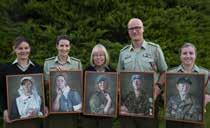

NEWS www.veteransaffairs.mil.nz spring 2018 3 Board to consider “who is a veteran” 8
7
Countdown to i nvictus g ames
nursing corps turns 100
Fallen welcomed home from Malaysia and singapore
About VA news
VA News is published four times a year by Veterans’ Affairs New Zealand— Te Tira Ahu Ika a Whiro.
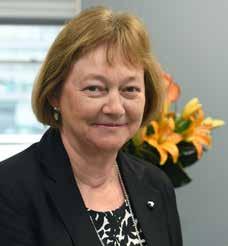
Our team takes care in writing great content and—to the best of our knowledge—has sourced accurate information.
The views expressed in VA News are not necessarily those of Veterans’ Affairs or the New Zealand Defence Force.

Contact us
For more information about Veterans’ Affairs or anything in this edition of VA News:
www.veteransaffairs.mil.nz
veterans@nzdf.mil.nz
0800 483 8372 (Freephone New Zealand)
1800 483 837 (Freephone Australia)
+64 4 495 2070 (rest of world)
Veterans’ Affairs PO Box 5146
Wellington 6140 New Zealand
Please note our Hamilton PO Box is now closed.
From the Head of Veterans’ Affairs
Tēnā koutou katoa
In this edition of VA News we have a number of really interesting items— I hope you’ll enjoy reading them. You will be keen to know what is happening now that Professor Ron Paterson has reported on his review of the operation of the Veterans’ Support Act. We have an article which summarises the first major announcement following the report which was made at the end of August by the Hon Ron Mark—the Veterans’ Advisory Board is going to look into the matter of who should be considered a veteran, and how they should be recognised. The Board has got some hard work ahead of them, and I welcome the opportunity to support them as they work through these important questions.
Many of you will have seen our new website, and we have been delighted with the good feedback on it. This is one of the ways in which we are aiming to make it easy for you to get information about how we can provide support. I’ll have more to tell you in the next VA News about ways we will be further improving our communications to you.
In late October, athletes from 18 nations will compete in the 2018 Invictus Games in Sydney. The games themselves will involve 11 different adaptive sporting events. I wish each
competitor the very best of luck—each one of them has a proud country standing right behind and cheering them on!
As the Head of Veterans’ Affairs, I had the honour of witnessing the return of our fallen from Malaysia, Singapore, and the United Kingdom as part of project Te Auraki. As with the earlier return at Ohakea in May, these ceremonies were dignified and very moving. I hope the return of their loved ones may help the families of those returned by providing them with closure after many years.

Ka maumahara tonu tātou
ki a rātou
We will remember them
2
in this issue 03 Board to consider “who is a veteran” 04 Invictus Games gives veteran new lease on life 06 Notices from the veteran community 07 Chat with Pat 07 Personnel repatriated from Malaysia and Singapore 08 Artist celebrates Royal New Zealand Nursing Corps 08 Vietnam Veterans Association out and about
Bernadine Mackenzie, Head of Veterans’ Affairs
The Right Honourable Jacinda Ardern, Prime Minister of New Zealand and the Honourable Ron Mark, Minister for Veterans and Minister of Defence at the ramp ceremony for the return of our fallen from Malaysia and Singapore.
Cover image: Warrant Officer 1st Class Daryl Burton hones his Wheelchair Tennis skills at a training camp for the Invictus Games at Burnham Military Camp.
Board to consider “who is a veteran”
‘Who should be considered a veteran’ will be the main question facing the new appointees to the Veterans’ Advisory Board.
The Board is a statutory body established by the Veterans’ Support Act 2014. Its role is to provide advice to the Minister for Veterans on a range of issues impacting veterans, including advice on policies and entitlements.
“The recently released report by Professor Ron Paterson analysed the Veterans’ Support Act, and identified recommendations which aim to improve it,” says Minister for Veterans Ron Mark.
“Many of these recommendations are already underway, but several, including looking at how we classify a veteran in New Zealand, need further work.
“I have decided to ask the Veterans’ Advisory Board to focus on this important issue.”
rsA District s upport Advisors
Veterans’ Affairs values the work of the RSA District Support Advisors— also known as DSAs.
There are 9 DSAs in New Zealand, and one recently appointed in Australia. They are often the first
“It will be complex—as it will involve not just a consideration of military matters—but also consideration of the broader social sector in New Zealand, including what entities such as the public health services and the ACC have to offer military personnel and former servicepersons.”
“The Board members who will be undertaking this piece of work will be bringing to it a wide variety of skills and experience. Most, but not all of them, have military backgrounds.”
The Board will be chaired by Leith Comer, who has extensive knowledge of the workings of government and leadership experience in the military, private and community sectors. He served in the New Zealand Army for 21 years, and has held senior positions as a public servant, including being
the Chief Executive of the Ministry of Maori Development.
The Deputy Chair will be the Hon Chester Borrows, who has experience in a non-military service, the New Zealand Police, as well as a distinguished Parliamentary career. The other members of the Board are RSA President BJ Clark, Fiona Cassidy, Baden Ewart, Denise Hutchins, Group Captain Leanne Woon and Warrant Officer of the Defence Force Mark Mortiboy. Wing Commander Michelle White is a deputy member of the Board.
Above: Members of the Veterans’ Advisory Board with the Hon Ron Mark, Minister for Veterans. Left to right: Hon Chester Borrows, WGCDR Michelle White, Denise Hutchins, BJ Clark, Hon Ron Mark, Baden Ewart, WO1 Mark Mortiboy, Fiona Cassidy, and Leith Comer. GPCAPT Leanne Woon was absent.
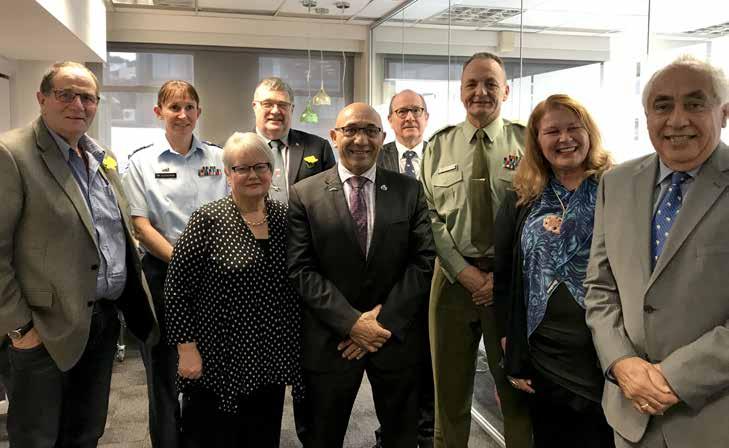
point of contact for veterans needing help, working with them to seek entitlements or assistance from Veterans’ Affairs and other agencies.
“We estimate that many of our DSAs work well in excess of 40 hours a week, coordinating and delivering support throughout their districts, managing complex cases, and helping to train local support advisers
who do much of the work on the ground.” says Mark Compain, the Support Services Manager at the RNZRSA National Office.
If you would like to discuss RSA support—in New Zealand or Australia— you can get in touch with a DSA. Their details are available from your local RSA or online: www.rsa.org.nz/support/team
3 visit us online www.veteransaffairs.mil.nz our people
i nvictus g ames gives veteran new lease on life
By Sharon Lundy, Defence Public Affairs
Daryl Burton reckons he couldn’t ask for a better bunch of people than those he deals with at Veterans’ Affairs (VA).
The Army veteran will this year compete in his second Invictus Games—an event he and his family credit with changing his focus from what he can’t do to what he can do.
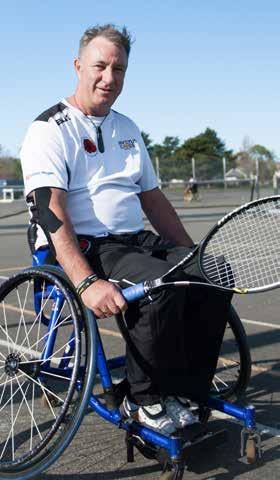
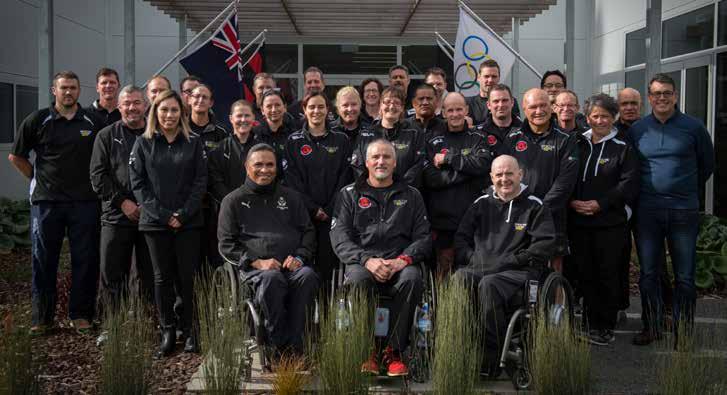
Daryl has been with the New Zealand Defence Force for 36 years; 30 with the Army and the past six as a civilian and Reserve Force soldier. While serving he suffered two events which would have life-long consequences, the first a back injury when he landed badly after jumping off a truck in Bosnia in 1995.
“I can remember vividly feeling this hot pain go right up the middle of
my spine, and I thought ‘that doesn’t feel good’. I just carried on but about a week later I collapsed because I couldn’t feel my legs.”
Worse was to come. Six years later, while on deployment in East Timor, a scorpion stung him on the underside of his thigh. He thought he had sat on a nail but the wound got bigger, and in the following days he started to get the shakes and feel ill. Then came the weight loss; he lost a third of his body weight in a month.
Daryl was flown to Darwin for treatment, where medical staff noticed his elevated thyroid levels; the bite had essentially made his body turn on itself, affecting his nerves and leaving him numb in his legs. Perhaps the worst ongoing effect is the feeling that insects are crawling under the skin on his face and shoulders – a sensation which can only be eased by scratching himself until he bleeds.
Until his injuries Daryl had been a talented sportsman, playing representative football and rugby in his younger years and then for the Army.
“I was one of those really lucky people. I was good at sport and I never had to work too hard at it. I was lucky and I knew it.”
Wife Janine and sons Josh and Daniel—a Royal New Zealand
4
The New Zealand team for the 2018 Invictus Games.
Engineers Sapper—say it made him difficult, grumpy, withdrawn, and sometimes angry. Daryl vividly remembers a young Josh screaming “don’t hit him, Dad” as he strode across a sports field during a game to confront a mouthy parent from the other team. He didn’t hit him. Just.
And there were the times he would fly off the handle while out late with his mates—mates who never said anything and who he now wishes had spoken up.
All the while he refused to admit anything was wrong, until he saw a new South African GP who “understood straight away”.
“He knew that these things can happen because it’s a neurotoxin that scorpions have.”
When Daryl “joked” to the GP that he probably had PTSD as well as all his physical injuries, the GP contacted VA, who referred Daryl to a pain relief clinical psychologist.
“Funnily enough he’s South African as well, and when I told him what was going on he said ‘that makes perfect sense as a result of the scorpion toxin’.
“I had a couple of talks to him and he wrote a report to VA saying I needed to go and see a psychiatrist. He told me ‘you’re a dangerous man’.”
As part of the VA process Janine, Daniel and Josh wrote down their thoughts on him. Daryl thought it would be a few lines. Nearly four pages later they stopped writing.
“I started looking at it and I thought ‘this is not good’. Reading what they had written was one of the scariest things I’ve ever done. It made me realise it was time to stop being an idiot and start doing something about it.”
Janine is the Deployed Services Officer at Linton Camp, working with the families of people who are on deployment, and says she noticed a big difference in Daryl’s attitude when he returned from his first Invictus Games training camp early last year.
“He had a whole different attitude. It wasn’t what he couldn’t do any more because of his injuries or his health, it was what he could do. So it was a complete switch.
“It was about another 12 months down the track then that he was even open to thinking that PTSD might be a component of what was going on.
“And that’s all because of Invictus, because of the team that he’s now associating with and acknowledging that ‘hey, it’s not so bad’. It’s not something he has to hide away from any more.”
Daryl puts the change in his attitude down to Invictus—but also to VA. He says they have been “absolutely fantastic” particularly his case manager who has supported him and worked hard at making sure he gets the help he needs and he urges other veterans to contact them.
“You couldn’t ask for a better bunch of people as far as I’m concerned. They’ve helped immensely.”
The NZDF team is sponsored by Auckland RSA, Christchurch Memorial RSA, Fulton Hogan, Jaguar Land Rover and Direct Sport.
The Invictus Games Sydney 2018 presented by Jaguar Land Rover will take place from 20-27 October 2018. About 500 competitors from 18 nations will compete in 11 different adaptive sports with events being held across Greater Sydney.
Throughout the Invictus Games the team’s journey can be followed on:
Facebook: facebook.com/ InvictusGamesNZ

Instagram: @nzdfinvictusteam
Twitter: @nzdefenceforce
5 visit us online www.veteransaffairs.mil.nz news
Daryl Burton (third from left) and his family, from left, son Daniel, grandson Sam (one), grandson Jack (four), wife Janine, son Josh, granddaughter Sarah (four) and daughter-in-law Tracy.
we want to hear from our Korea veterans
If you are one of our Korea veterans and you are interested in being interviewed as part of a special project being sponsored by the Korean Ministry of Patriots and Veterans Affairs, we would love to hear from you.
Interviews will take place in New Zealand, probably during February and March 2019. They will appear on a special website to commemorate the 70th Anniversary of the outbreak of hostilities between North and South Korea.
Please contact us to register your details.
n otice of trust Ag M
The Annual General Meeting for the Viet Nam Veterans and their Families Trust will be held later this year.

1 December 2018, 10.30am
Taradale RSA
156 Gloucester Street, Taradale, Napier Morning tea will be provided before the AGM, which will be followed by lunch.
Further information on the Trust is available at: communitymatters.govt.nz
0800 824 824 trusts@dia.govt.nz
i mprovements to the application process
We’ve recently begun a complete review of our application process. Our goal is to take out unnecessary steps and speed things up. While the review is underway we’re making small changes that will help us to start making decisions as soon as we can. For example, we no longer wait 14 days for you to comment on a medical report we receive from a specialist. Most veterans don’t disagree with specialist reports—but if you do, or you want your specialist to add information, just let us know. We’ll hold off making that part of the decision until the matter’s been sorted.
educational funding available to descendants of veterans
Heritage Canterbury provides assistance to the children and grandchildren—including young adults—who are the descendants of those who have served in the New Zealand Armed Forces, either overseas or in New Zealand.
They can provide financial support with education costs and special needs. Recipients, or their family, must have their primary place of residence in Canterbury.
For more information contact the Secretary, Heritage (Canterbury) Inc.:
Mrs Karen Clarke c/- 24 Westlake Drive Christchurch 8025 heritagecanterburyinc@gmail.com +64 3 3 379 7122
n eed to talk?
The 4-digit number is free to call or text, and will connect you to a trained counsellor. The professional counsellors are available 24 hours a day, 7 days a week. They are there to talk to anyone feeling stressed, anxious, worried, depressed, or needing advice on mental health or addiction issues.

6
noti C es
“1737, need to talk?” is New Zealand’s new national mental health and addictions helpline.
dec 01
personnel repatriated from Malaysia and s ingapore
The remains of 27 New Zealand military personnel and one child repatriated from Malaysia and Singapore have been returned to their families at a ramp ceremony at Auckland International Airport.
The New Zealand Army soldiers were serving in Malaysia, Thailand, and Vietnam when they died. The child was the son of a member of the Army. The remains were returned on a chartered Air New Zealand flight and

Chat with pat
VA News: Thanks for sitting down with us again Pat. We had some great feedback since our last edition of VA News
Pat: Thanks! It’s been great to be able to connect with our veterans and their whānau in another way. We’ve had calls and messages from a number of veterans that I’ve not spoken to for many years—it’s been really nice.
VA News: What’s been happening since we last sat down?
Pat: As a lot of our readers will know, we’ve been trying to get out and about to meet as many veterans as we can— especially in their own communities. With the Invictus Games coming up in Sydney, we have taken the opportunity to run some veteran clinics in the region. We’ve sent out invites to all veterans who we know are living in the area, but if anyone hasn’t received one we’d really like to hear from them.
VA News: That sounds fantastic
Pat. I’ve also heard we’ve recently introduced some improvements to the Veterans’ Independence Programme. Can you expand on this?
were received with a traditional Māori welcome, before the caskets were carried past a guard of honour and handed back to their families.
A short private family service was held, followed by a New Zealand Defence Force haka as the hearses left the airport.
Te Auraki project manager Group Captain Carl Nixon said it was important to return the fallen personnel in a dignified manner, in accordance with contemporary cultural, religious and military protocols.
“Today we honour the memory of a child and the sacrifice of 27 soldiers who died serving their country overseas. We’re bringing them home to their families, who have waited more than 60 years for this moment,” Group Captain Nixon said.
of death.”
The arrival home was witnessed by representatives from Malaysia and Singapore, and also Veterans’ Affairs, the RSA, and Vietnam and Malayan veterans’ organisations
The remains will be reinterred at Service, public, or private cemeteries, depending on family preferences and the service person’s qualifying service. The final two tranches of project Te Auraki brought two personnel back from England in September, and will bring two home from the Republic of Korea in October.
Pat Povey is a familiar face—or voice—to many veterans and their whānau. VA News sat down with Pat in our new regular series 'Chat with Pat'.
Pat: Absolutely. I’m really pleased to say we’re now able to offer additional services under our agreement with Chemwash. In addition to house washing, gutter clearing, and external window cleaning, we can now also fund the washing of pathways and driveways, and gutter clearing on stand alone garages. There are a few parameters around this, but it’s a great improvement.
VA News: How can veterans go about accessing these new services?
Pat: Veterans already getting services from Chemwash will be contacted before their service is scheduled. They don’t need to do anything else until then. If you’re not getting these services yet, then get in touch with us.
VA News: Sounds nice and easy. Have you anything else you’d like to talk about?
Pat: I’ve heard a little bit of confusion about eligibility for the Veteran’s Pension. If you served, have qualifying operational service, and meet the criteria for NZ Superannuation you’re able to get the Veteran’s Pension.

It’s paid by the Ministry of Social Development instead of NZ Superannuation, and comes with a few additional benefits. There’s really no downside to it.
VA News: And what about spouses and partners?
Pat: Good question. Spouses and partners can get a Veteran’s Pension if their veteran partner is getting either a War Disablement Pension of at least 70% or has a whole-person impairment of 52% or more. If a veteran or their spouse or partner isn’t sure about anything, they can get in touch with us to check.
VA News: Any final thoughts for our readers?
Pat: As always, we’re here if you have any questions or concerns. Whether it’s help with filling out a form or ideas on how we can better support you, please do not hesitate to get in touch.
7 visit us online www.veteransaffairs.mil.nz news
“This project is about making sure the inequalities and inconsistencies of the past are put right and everyone is treated the same, regardless of wealth, rank or cause
Artist celebrates royal n ew Zealand n ursing Corps
Artist and Army reservist Matt Gauldie has completed five paintings to mark the centenary of the New Zealand Army’s Royal New Zealand Nursing Corps (RNZNC).
The paintings, which depict current serving nursing officers in period uniforms, have been presented to the New Zealand Defence Force’s Chief Nursing Officer, Lieutenant Colonel Lee Turner.
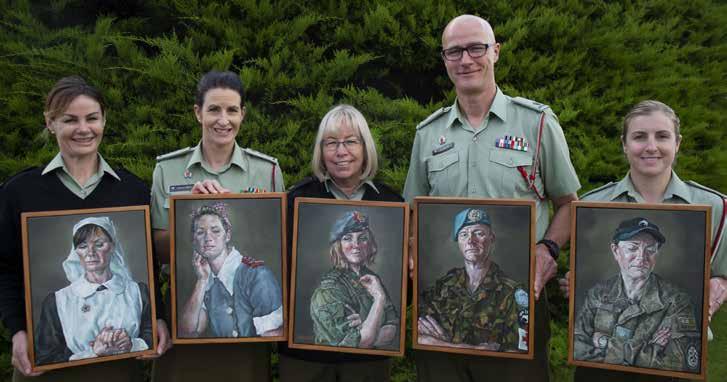
Matt Gauldie said he had a lot of admiration for the work Nursing Officers do, and he enjoyed painting their portraits.
“They sourced all their own uniforms, and were very patient when I was
spending time getting the detail right.”
He took photographs of each nurse in their period uniform, and completed the portraits from the photographs over several months.
The New Zealand Army has officially included nurses since the First World War, although a small team of New Zealand nurses served with the British Nursing Service in South Africa before that.
Since the First World War, the Army’s Nursing Officers have served in every major conflict New Zealand has been involved in. More than 500 nurses served in the First World War and more than 600 joined the Second World War effort, serving in the Pacific, Egypt, England, Greece, Crete, Syria, Tunisia and Italy.
In 1953 the New Zealand Army Nursing Service became the Royal New Zealand Nursing Corps (RNZNC),
and the first RNZNC officer was later sent to Vietnam to work with the Australians at Vung Tau.
In 1991 New Zealand sent a medical team to the Gulf War, and RNZNC officers have served throughout the world on various deployments since then.

For more information:
Visit: nzvietnamveterans.org.nz
Email: secretary@ nzvietnamveterans.org.nz
8
The Vietnam Veterans Association has launched Operation Outreach. The operation aims to connect the association with Vietnam veterans in their communities, and will see the association’s executive travelling throughout New Zealand.
Above: From left, Major Hayley Claridge with a portrait of herself in a First World War nursing uniform, Captain Lauren Miller with a portrait of Lieutenant Majken Margetts in a Second World War uniform, Major Debbie Cromie with a painting depicting Captain Megan Shaw in a Vietnam-war era uniform, Major Ian Barrett with himself in the uniform he wore in East Timor, and Lieutenant Jolie Colliar with a contemporary portrait of Major Vanessa Leigh.
visit us online www.veteransaffairs.mil.nz
Matt Gauldie

















